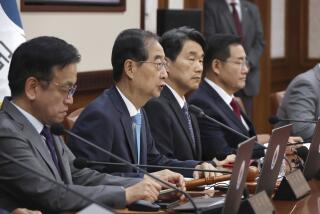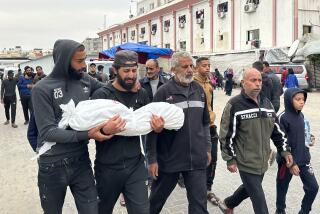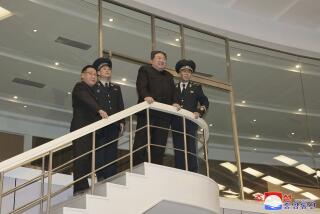China Reverses Its Refusal to Search N. Korean Cargo
- Share via
UNITED NATIONS — U.S. Secretary of State Condoleezza Rice pressed China on Monday to help stop flows of weapons-related goods to and from North Korea, as Beijing reversed its refusal to conduct inspections but continued to oppose interceptions that might lead to conflict.
On the eve of a weeklong trip to Japan, China, South Korea and Russia to discuss how to contain and engage North Korea, Rice said she was confident that China would make “all efforts” to prevent North Korea from trading in dangerous materials.
China, along with the rest of the U.N. Security Council, backed a sanctions resolution on North Korea that called for aggressive land, air and sea inspections and seizure of materials if necessary.
The council acted Saturday after the government in Pyongyang tested a nuclear device Oct. 9. The office of National Intelligence Director John D. Negroponte confirmed Monday that radioactive debris was detected in air samples collected Wednesday near Punggye.
After the vote, China said it would not participate in the inspections because it feared they would lead to confrontation near its borders. Chinese Ambassador Wang Guangya softened that stance Monday, saying that China has always conducted inspections on its borders and in its ports, and is considering ways to strengthen them.
But China is still wary of aggressive interdictions and seizures -- especially in international waters or airspace, where the law is murky.
“Inspections are one thing. Interdiction and interception are another. In the high seas or in the air, if you have suspicion of a particular cargo, what do you do?” he asked. “What about freedom of the high seas, and freedom of passage? It has to be done with great care.
“We must be careful that it won’t be carried out in such a way like a quarantine, searching every ship going in and out of a country. Most countries consider that an act of war. It could easily lead to unnecessary confrontation,” Wang said.
North Korea has warned that it would consider Security Council sanctions “a declaration of war” and take countermeasures.
China stepped up inspections of trucks at the 880-mile border’s main crossing in Dandong after the resolution passed, the Associated Press reported.
China is building a massive fence along parts of its border with North Korea, the AP reported. It said farmers and visitors had seen scores of soldiers near the Yalu River erecting concrete barriers and stringing barbed wire.
Rice said she was “not concerned that the Chinese are going to turn their backs on their obligations. I don’t think they would have voted for a resolution if they did not intend to carry through on it.”
Asked about reports that a second nuclear test might be ahead, Rice said that she did not expect Pyongyang to commit “such a provocative act.”
She said the U.N. resolution held a lesson for Iran, whose nuclear program is to be the focus of a sanctions discussion this week at the Security Council.
Tehran “can now see that the international community will respond” to efforts to acquire nuclear weapons, Rice said.
Iranian President Mahmoud Ahmadinejad said his country would not be intimidated by the sanctions on North Korea and planned to push ahead with its nuclear program.
*
Times staff writer Paul Richter in Washington contributed to this report.
More to Read
Sign up for Essential California
The most important California stories and recommendations in your inbox every morning.
You may occasionally receive promotional content from the Los Angeles Times.













